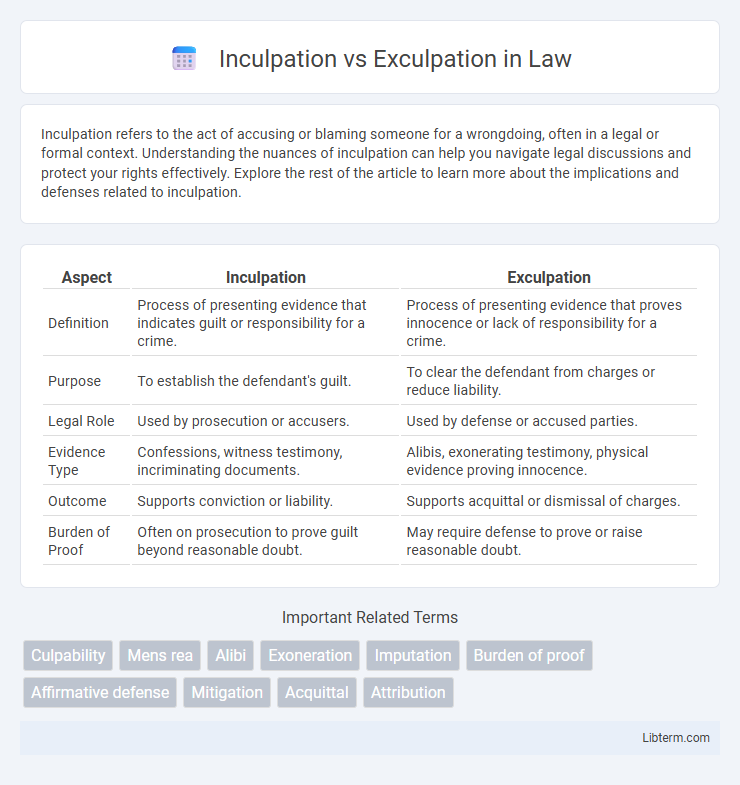Inculpation refers to the act of accusing or blaming someone for a wrongdoing, often in a legal or formal context. Understanding the nuances of inculpation can help you navigate legal discussions and protect your rights effectively. Explore the rest of the article to learn more about the implications and defenses related to inculpation.
Table of Comparison
| Aspect | Inculpation | Exculpation |
|---|---|---|
| Definition | Process of presenting evidence that indicates guilt or responsibility for a crime. | Process of presenting evidence that proves innocence or lack of responsibility for a crime. |
| Purpose | To establish the defendant's guilt. | To clear the defendant from charges or reduce liability. |
| Legal Role | Used by prosecution or accusers. | Used by defense or accused parties. |
| Evidence Type | Confessions, witness testimony, incriminating documents. | Alibis, exonerating testimony, physical evidence proving innocence. |
| Outcome | Supports conviction or liability. | Supports acquittal or dismissal of charges. |
| Burden of Proof | Often on prosecution to prove guilt beyond reasonable doubt. | May require defense to prove or raise reasonable doubt. |
Understanding Inculpation: Definition and Significance
Inculpation refers to the act of incriminating or assigning blame to an individual for a particular offense or wrongdoing, serving as a key concept in legal proceedings and criminal investigations. It involves presenting evidence or arguments that establish a person's culpability, which plays a crucial role in determining guilt and ensuring accountability within the justice system. Understanding inculpation is essential for comprehending how legal responsibility is attributed and how cases are constructed against suspects or defendants.
Exculpation Explained: Clearing the Path to Innocence
Exculpation refers to the act of clearing an individual from blame or guilt by providing evidence or arguments that prove their innocence. This legal concept involves demonstrating that the accused did not commit the alleged offense or that there are justifiable reasons for their actions. Effective exculpation relies on verified facts, credible witnesses, and supporting documentation to establish a clear path to innocence.
Key Legal Differences Between Inculpation and Exculpation
Inculpation involves presenting evidence or arguments that attribute guilt or liability to a defendant, whereas exculpation focuses on proving innocence or absence of wrongdoing. The key legal differences hinge on the burden of proof, with inculpation requiring the prosecution to establish culpability beyond a reasonable doubt, while exculpation often relies on defense evidence to create reasonable doubt. Understanding these distinctions is critical for legal strategies in criminal cases, as inculpatory evidence supports conviction, whereas exculpatory evidence aims to prevent it.
The Role of Evidence in Inculpation vs Exculpation
Evidence plays a critical role in inculpation by establishing a defendant's guilt through direct or circumstantial proof, such as testimonies, physical objects, and forensic data. In exculpation, evidence serves to clear the accused by demonstrating innocence or creating reasonable doubt, including alibis, contradictory facts, or flawed prosecution arguments. The strength, credibility, and admissibility of this evidence determine whether the judicial outcome favors inculpation or exculpation.
Burden of Proof: Who Bears Responsibility?
Inculpation refers to the act of proving a defendant's guilt, while exculpation involves providing evidence to establish a defendant's innocence. The burden of proof primarily lies with the prosecution, which must demonstrate inculpation beyond a reasonable doubt in criminal cases. The defense may shift the burden to produce exculpatory evidence, but the ultimate responsibility to prove guilt remains with the prosecution.
Common Examples of Inculpatory and Exculpatory Evidence
Inculpatory evidence typically includes fingerprints at a crime scene, surveillance footage showing a suspect's presence, and eyewitness testimonies identifying the accused. Exculpatory evidence often involves alibis verified by credible witnesses, video recordings clearing a suspect of wrongdoing, and forensic results that exclude the accused's involvement. Understanding the distinction between inculpatory and exculpatory evidence is crucial for ensuring a fair judicial process.
Impact on Criminal Proceedings and Verdicts
Inculpation involves presenting evidence that establishes a defendant's guilt, significantly influencing the prosecution's case and increasing the likelihood of conviction. Exculpation provides evidence that negates guilt or reduces culpability, often leading to acquittal or lesser charges. The balance between inculpatory and exculpatory evidence critically shapes judicial decisions, impacting verdicts and the overall fairness of criminal proceedings.
Rights of the Accused: Ensuring a Fair Trial
Inculpation and exculpation are critical concepts in criminal law affecting the rights of the accused to a fair trial. Inculpation involves presenting evidence or arguments that suggest guilt, while exculpation focuses on demonstrating innocence or mitigating circumstances. Ensuring the accused's rights includes the fair assessment of both inculpatory and exculpatory evidence to uphold the principles of justice and prevent wrongful convictions.
Challenges in Establishing Inculpation or Exculpation
Establishing inculpation involves proving a defendant's guilt beyond a reasonable doubt, which requires strong, admissible evidence and often faces challenges such as witness reliability and evidentiary gaps. Exculpation demands demonstrating innocence or mitigating factors, complicated by high standards of proof and potential biases in the judicial process. Both processes confront evidentiary limitations, interpretative disputes, and the burden of overcoming presumption either of guilt or innocence.
Legal Reforms and Future Implications
Legal reforms increasingly emphasize the refinement of inculpation and exculpation standards to enhance judicial accuracy and fairness. Advances in forensic technology and evidentiary rules strengthen exculpatory evidence evaluation, reducing wrongful convictions while ensuring accountability. Future implications include more dynamic legal frameworks that adapt to emerging scientific methods and uphold defendants' rights through balanced inculpatory and exculpatory assessments.
Inculpation Infographic

 libterm.com
libterm.com